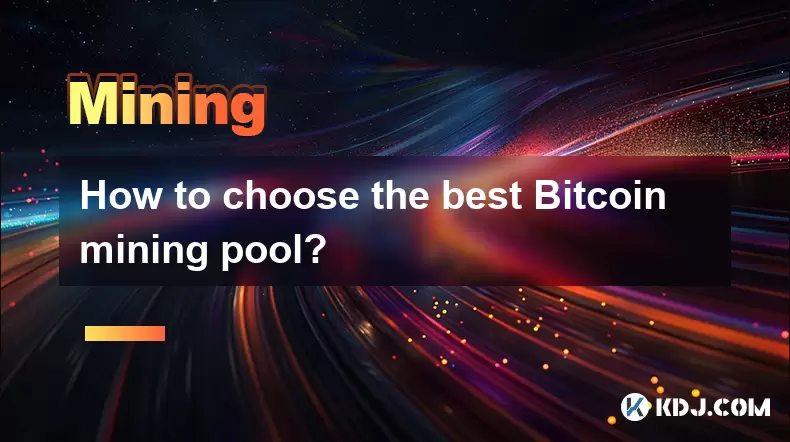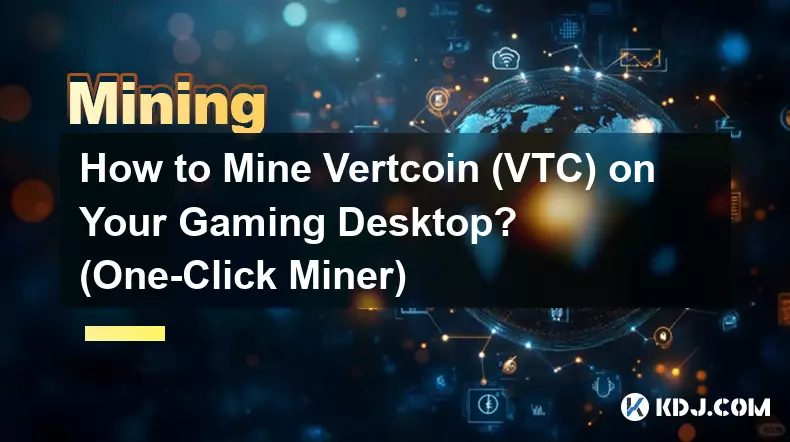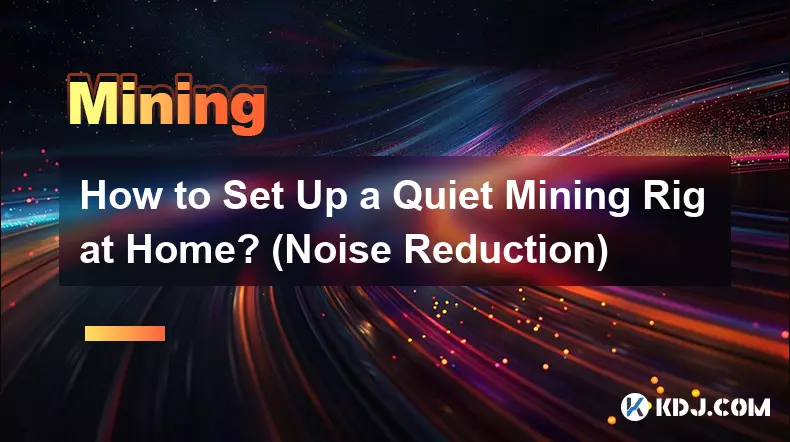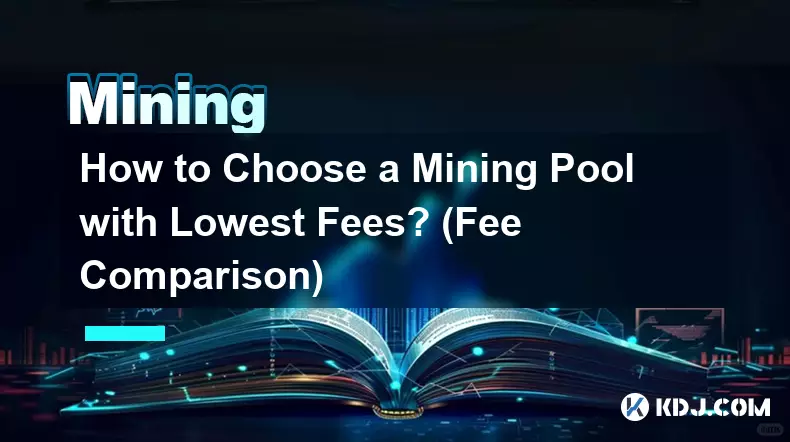-
 bitcoin
bitcoin $87959.907984 USD
1.34% -
 ethereum
ethereum $2920.497338 USD
3.04% -
 tether
tether $0.999775 USD
0.00% -
 xrp
xrp $2.237324 USD
8.12% -
 bnb
bnb $860.243768 USD
0.90% -
 solana
solana $138.089498 USD
5.43% -
 usd-coin
usd-coin $0.999807 USD
0.01% -
 tron
tron $0.272801 USD
-1.53% -
 dogecoin
dogecoin $0.150904 USD
2.96% -
 cardano
cardano $0.421635 USD
1.97% -
 hyperliquid
hyperliquid $32.152445 USD
2.23% -
 bitcoin-cash
bitcoin-cash $533.301069 USD
-1.94% -
 chainlink
chainlink $12.953417 USD
2.68% -
 unus-sed-leo
unus-sed-leo $9.535951 USD
0.73% -
 zcash
zcash $521.483386 USD
-2.87%
How to choose the best Bitcoin mining pool?
A Bitcoin mining pool combines miners' resources to boost block discovery chances, offering steady rewards based on contributed hash power and shared fees.
Jul 03, 2025 at 05:07 pm

What is a Bitcoin Mining Pool?
A Bitcoin mining pool is a group of miners who combine their computational resources to increase the probability of successfully mining a block. By pooling resources, individual miners can receive more consistent rewards based on their contributed hash power. When a block is mined, the reward is distributed among participants proportionally. Choosing the right mining pool is crucial for maximizing profitability and minimizing risks.
Understanding Pool Fee Structures
One of the most important factors in selecting a mining pool is its fee structure. Most pools charge a percentage-based fee for their services, typically ranging from 0% to 4%. Some pools offer zero fees but may include other hidden costs or lower payout rates. It's essential to compare fee models like PPS (Pay Per Share), PPLNS (Pay Per Last N Shares), and PROP (Proportional) to understand how they affect your earnings over time.
- PPS: Miners are paid immediately for each valid share they submit.
- PPLNS: Rewards are based on the number of shares submitted during a specific round.
- PROP: Rewards are split according to the number of shares each miner contributes.
Each model has different risk and reward profiles depending on the stability of the pool and network difficulty.
Evaluating Pool Size and Hashrate Distribution
The size of a mining pool, measured by its total hashrate, directly affects the frequency of block discoveries. Larger pools tend to find blocks more often, leading to steadier payouts. However, very large pools can centralize mining power, which poses potential risks to Bitcoin’s decentralized nature.
It’s important to strike a balance between reliability and decentralization. A pool with 5% to 20% of the global Bitcoin hashrate is generally considered ideal. Always check real-time statistics from sources like Blockchain.com or BTC.com to assess current pool distributions before committing.
Geographic Location and Server Latency
Miners should also consider the physical location of a pool’s servers. Lower network latency ensures that your mining rigs communicate more efficiently with the pool, reducing rejected shares and increasing overall efficiency. Many top-tier pools offer multiple server locations around the world to minimize delays.
To test server latency:
- Use the ping command from your mining rig to each available server endpoint.
- Check for response times under 100ms for optimal performance.
- Choose the closest or lowest-latency server when configuring your mining software.
Some pools automatically assign the nearest server, while others allow manual selection.
Security and Transparency Features
Security is a major concern when choosing any online service, especially one handling cryptocurrency. Reputable mining pools implement strong security measures such as:
- Two-factor authentication (2FA) for account access
- Encrypted communication protocols (HTTPS/SSL)
- Transparent payout records and real-time dashboard monitoring
Transparency in operations helps build trust. Look for pools that publish block discovery logs, payout history, and fee breakdowns. Avoid pools with unclear policies or a history of unexplained fund withdrawals.
Additionally, ensure the pool supports stratum protocol v1 or v2, which enhances security and efficiency in communication between miners and the pool.
Compatibility with Mining Hardware and Software
Not all mining pools support every type of hardware or software. Before joining a pool, confirm that it is compatible with your ASIC miner model (e.g., Antminer S19, WhatsMiner M30) and preferred mining software (e.g., CGMiner, BFGMiner, Awesome Miner).
Most modern pools provide detailed configuration guides tailored to specific hardware setups. These guides usually include:
- Connection URLs and ports
- Worker setup instructions
- API access details
- Custom firmware recommendations
If you're using a less common mining device, verify community feedback or reach out to the pool’s support team before investing significant time or effort.
Frequently Asked Questions (FAQ)
Q: Can I switch mining pools without losing my mined coins?A: Yes, switching pools does not affect previously mined coins. Once a payout is generated and sent to your wallet address, it remains there regardless of future pool changes.
Q: How often do mining pools pay out rewards?A: Payout schedules vary by pool and payment method. Some pools offer daily automatic payouts, while others require a minimum threshold (e.g., 0.01 BTC) before releasing funds.
Q: Are there any risks associated with small mining pools?A: Small pools may result in irregular payouts due to lower block-finding probabilities. They can also be less stable or maintained by inexperienced teams, increasing the risk of downtime or closure.
Q: Is it possible to mine solo instead of joining a pool?A: Solo mining is technically possible but extremely unlikely to yield results unless you have access to a substantial amount of hashpower (e.g., several hundred PH/s). For most individuals, joining a pool is far more practical.
Disclaimer:info@kdj.com
The information provided is not trading advice. kdj.com does not assume any responsibility for any investments made based on the information provided in this article. Cryptocurrencies are highly volatile and it is highly recommended that you invest with caution after thorough research!
If you believe that the content used on this website infringes your copyright, please contact us immediately (info@kdj.com) and we will delete it promptly.
- Zama Lists on Multiple Exchanges, Airdrop Window Opens Amidst Strong Auction Performance
- 2026-02-02 19:05:01
- Bitcoin's Plunge Spurs Whale Activity Amidst Liquidity Crunch: A New York Take
- 2026-02-02 19:10:02
- Token Market Evolution: Digital Finance and RIV Files Usher in Era of Institutional Trust
- 2026-02-02 19:05:01
- ZAMA Token's Imminent Launch: A Price Prediction and Analysis Amidst Shifting Crypto Tides
- 2026-02-02 19:00:02
- Binance's SAFU Fund Goes Bitcoin-Heavy: A Bold Move for User Protection and Bitcoin Investment
- 2026-02-02 19:00:02
- Bitcoin's Big Dip: From Peak Hopes to Present Plunge
- 2026-02-02 18:55:01
Related knowledge

How to Spot a Cloud Mining Scam? (Red Flags to Watch For)
Feb 02,2026 at 08:20am
Unrealistic Return Promises1. Platforms advertising guaranteed daily returns above 1–2% without disclosing underlying hardware, electricity costs, or ...

How to Earn Passive Income with DePIN Mining? (New Trend 2026)
Feb 01,2026 at 12:40pm
Understanding DePIN Mining Mechanics1. DePIN mining relies on real-world infrastructure participation rather than computational hashing. Users deploy ...

How to Mine Vertcoin (VTC) on Your Gaming Desktop? (One-Click Miner)
Feb 02,2026 at 03:39am
Understanding Vertcoin's Mining Algorithm1. Vertcoin uses the Verthash algorithm, which is intentionally memory-hard and designed to resist ASIC domin...

How to Set Up a Quiet Mining Rig at Home? (Noise Reduction)
Feb 01,2026 at 11:00pm
Acoustic Enclosure Design1. Use rigid, dense materials such as MDF or acoustic-grade plywood for the enclosure walls to block mid-to-high frequency no...

How to Choose a Mining Pool with Lowest Fees? (Fee Comparison)
Feb 02,2026 at 02:39am
Understanding Mining Pool Fee Structures1. Pool operators charge fees to cover infrastructure, maintenance, and administrative costs. These fees manif...

How to Mine Bitcoin on Mac (M1/M2/M3)? (Software Tutorial)
Feb 01,2026 at 07:19pm
Understanding Bitcoin Mining on Apple Silicon1. Bitcoin mining relies on solving cryptographic puzzles using computational power, and Apple’s M1, M2, ...

How to Spot a Cloud Mining Scam? (Red Flags to Watch For)
Feb 02,2026 at 08:20am
Unrealistic Return Promises1. Platforms advertising guaranteed daily returns above 1–2% without disclosing underlying hardware, electricity costs, or ...

How to Earn Passive Income with DePIN Mining? (New Trend 2026)
Feb 01,2026 at 12:40pm
Understanding DePIN Mining Mechanics1. DePIN mining relies on real-world infrastructure participation rather than computational hashing. Users deploy ...

How to Mine Vertcoin (VTC) on Your Gaming Desktop? (One-Click Miner)
Feb 02,2026 at 03:39am
Understanding Vertcoin's Mining Algorithm1. Vertcoin uses the Verthash algorithm, which is intentionally memory-hard and designed to resist ASIC domin...

How to Set Up a Quiet Mining Rig at Home? (Noise Reduction)
Feb 01,2026 at 11:00pm
Acoustic Enclosure Design1. Use rigid, dense materials such as MDF or acoustic-grade plywood for the enclosure walls to block mid-to-high frequency no...

How to Choose a Mining Pool with Lowest Fees? (Fee Comparison)
Feb 02,2026 at 02:39am
Understanding Mining Pool Fee Structures1. Pool operators charge fees to cover infrastructure, maintenance, and administrative costs. These fees manif...

How to Mine Bitcoin on Mac (M1/M2/M3)? (Software Tutorial)
Feb 01,2026 at 07:19pm
Understanding Bitcoin Mining on Apple Silicon1. Bitcoin mining relies on solving cryptographic puzzles using computational power, and Apple’s M1, M2, ...
See all articles










































































